The definitive guide to bookkeeping, payroll, and billpay (aka payables)
Church Accounting 101 = Keeping Your Money on Mission
We thought a quote from Dwelling Place Executive Pastor Greg Scherer summed up “church accounting 101” as well as we’ve ever heard it. He said:
“Finances aren’t the foundation of ministry, but you can’t do ministry without it. Money isn’t the reason for ministry, but it enables ministry.”
Greg Scherer
That’s why Parable exists: To help churches accomplish their mission using their finances wisely. And for us, there are really three church accounting systems every church needs to get in order if they want to achieve missional effectiveness with every dollar that passes through their hands: Bookkeeping, payroll, and bill pay (aka payables and reimbursements).
In this article, we’ll expound on these three critical systems. We’ll dive into what church leaders need to know about them to steward God’s money with excellence and confidently report their decisions to donors (and auditors!)
Table of Contents:
- Bookkeeping for Churches
- What Can Quality Bookkeeping Do for Your Church?
- How to Create a Successful Bookkeeping System for Your Church
- Payroll for Churches
- What is payroll for churches?
- Church Payroll Glossary: Form 941, FICA, SECA, and Dual Tax Status
- Common Problems with Payroll for Churches
- How to Repair Your Church’s Payroll Process
- Bill Pay for Churches: Payables, Check Requests, and Reimbursements
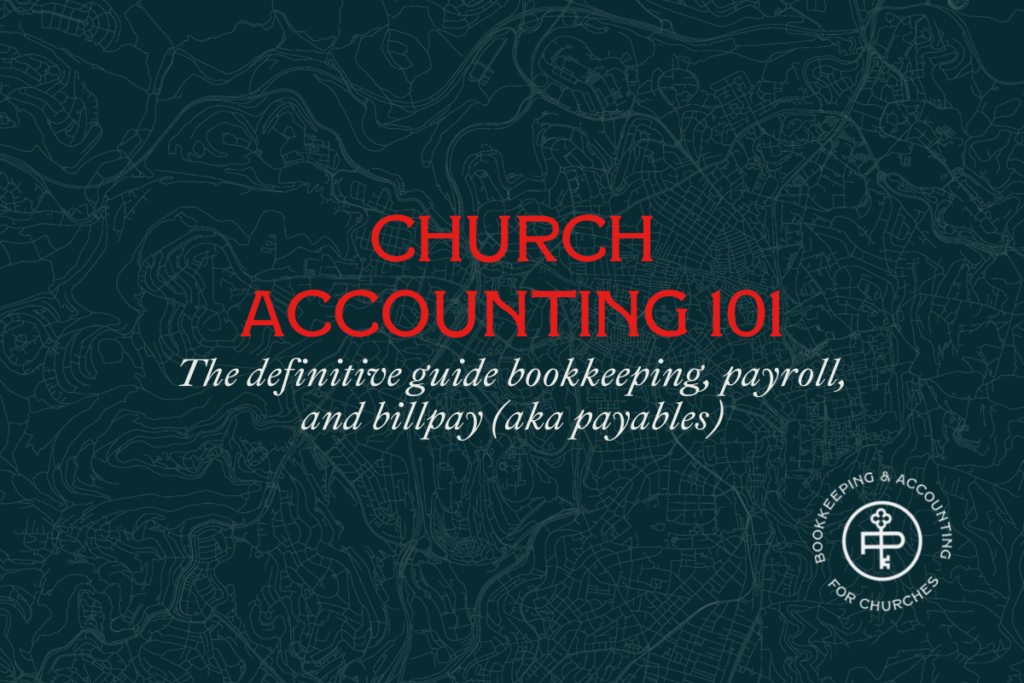
Bookkeeping for Churches
Church bookkeeping sounds simple. It’s the process by which you ensure every dollar has been appropriately categorized, is easy to report, and aligns with the total amount in your bank account.
Even more importantly, it’s about integrity. When someone gives money to outreach, you need to ensure no one spends it on new audio equipment for the worship leader’s office. (Even though she probably needs it!)
Check out The Complete Guide to Bookkeeping for Churches
Quality church bookkeeping doesn’t just show you numbers. It shows you a story.
That’s right, the depth and breadth of your ministry’s story—much of the heart-lifting, life-changing impact you’re making—is hiding in a spreadsheet and waiting to be revealed. Where each dollar goes and what it accomplishes says more about your church than most leaders realize.
It’s the story of your present missional effectiveness and your church’s future potential.
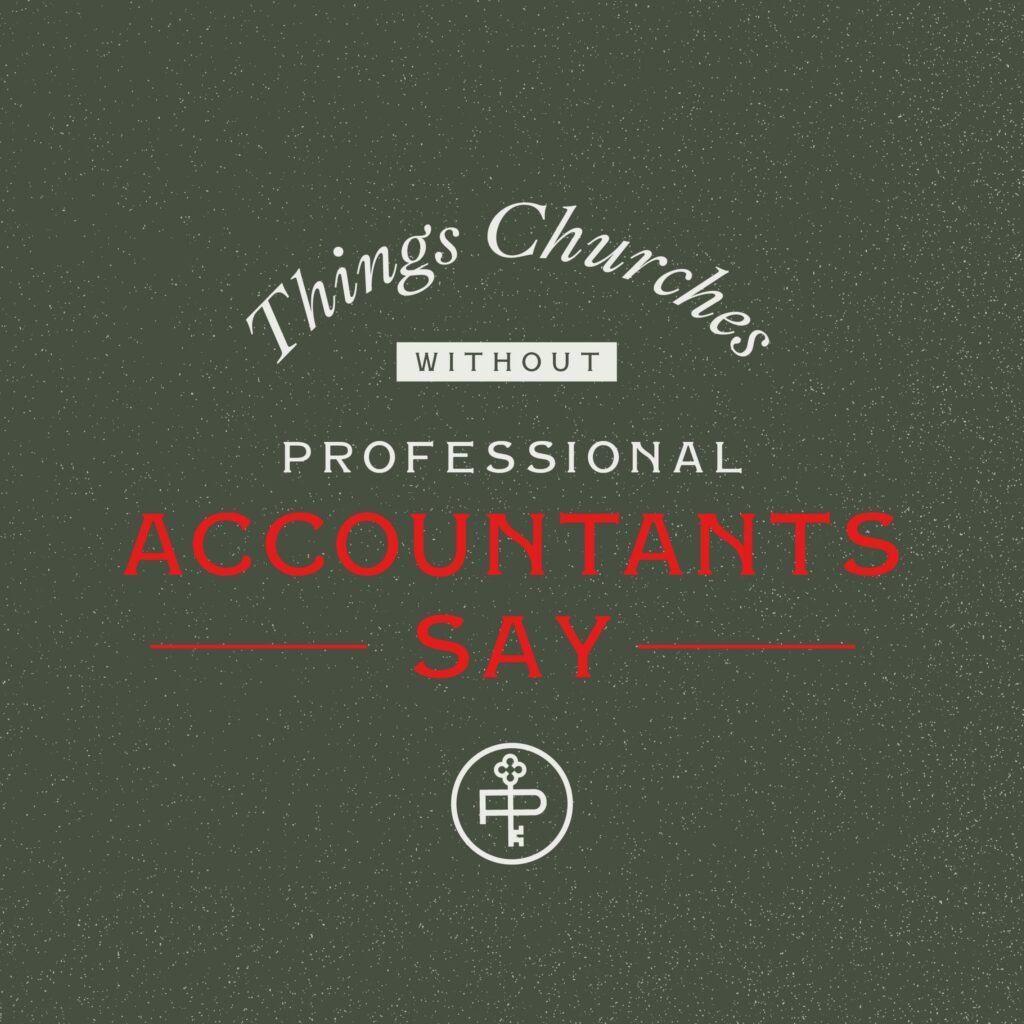



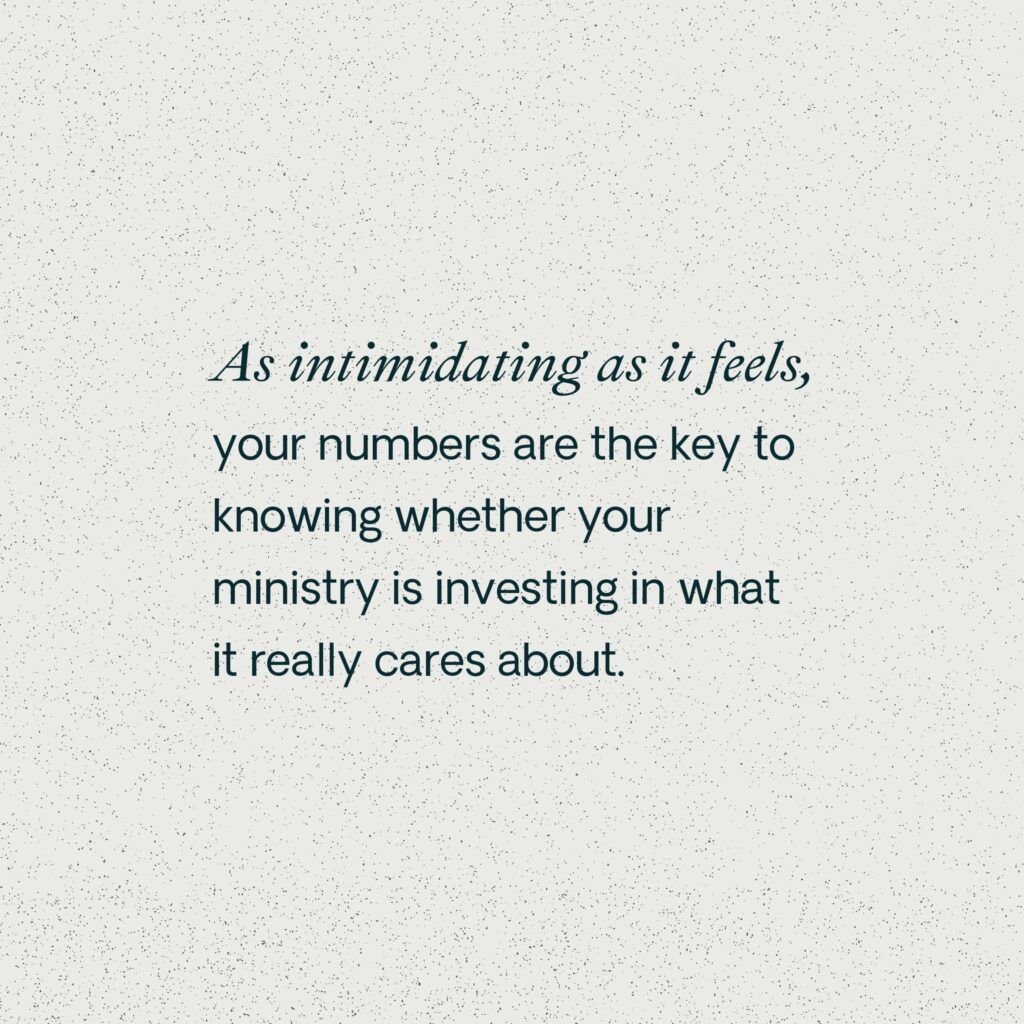

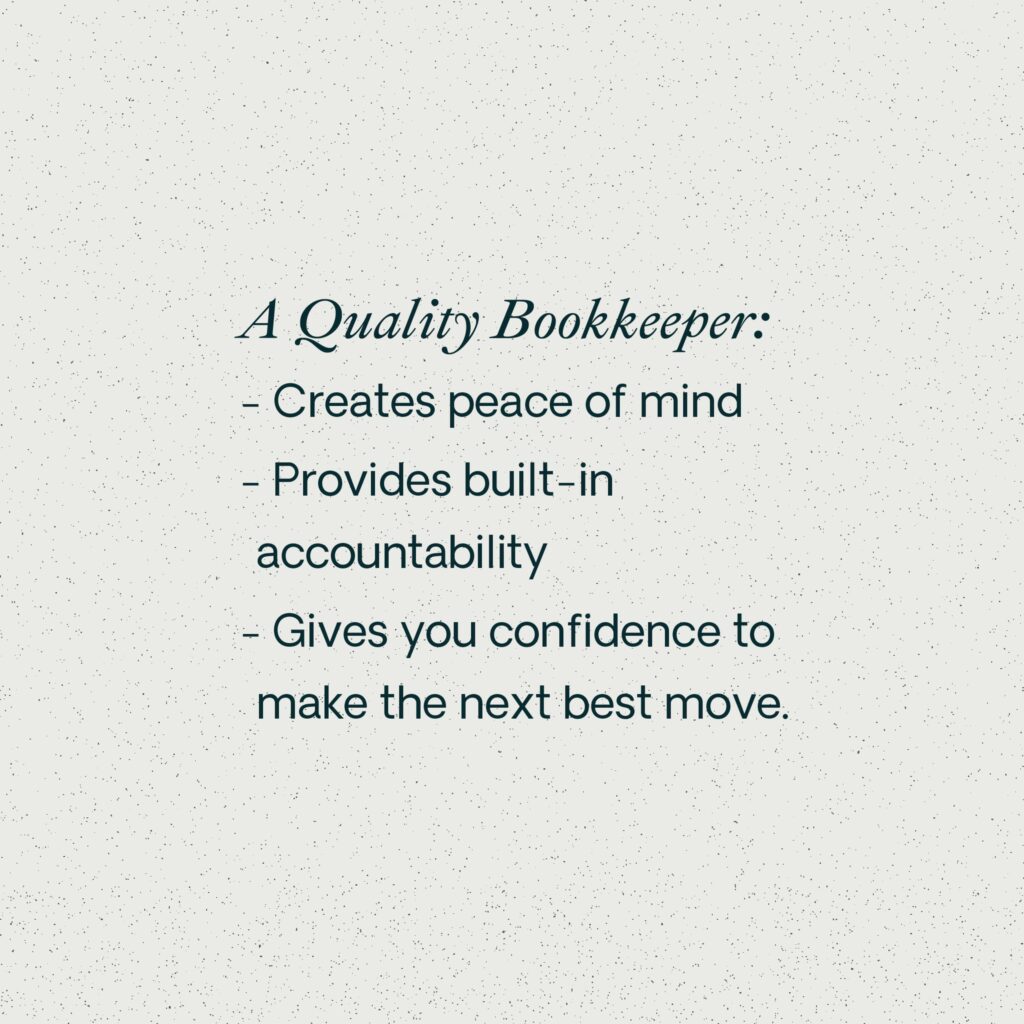
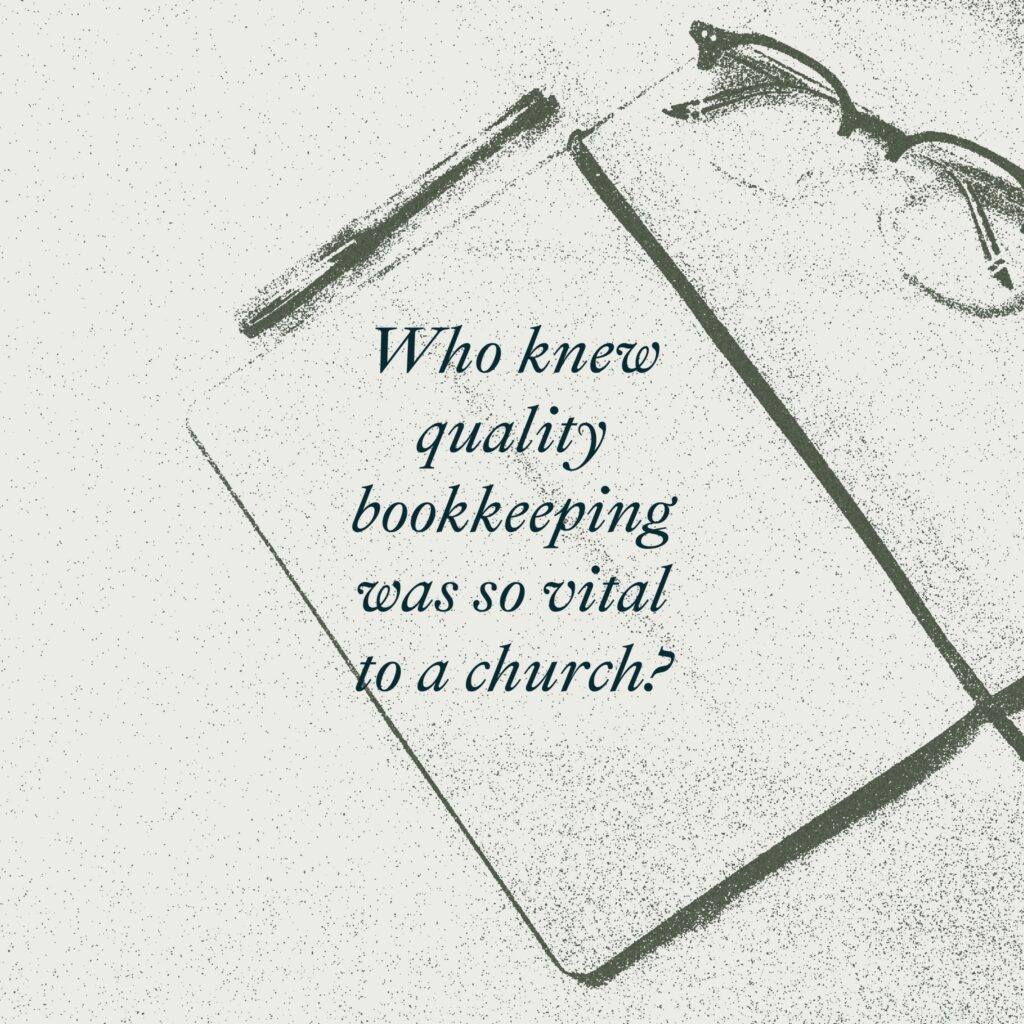
What Can Quality Bookkeeping Do for Your Church?
CREATE PEACE OF MIND
You’re probably not a financial-loving, detail-oriented nerd who has all the time in the world to double-check expenses (like we are!). And there are probably a million other tasks you’d rather spend your time on.
But money is a universal stressor, so while you’re not diving into it, it may take up space in the back of your mind. Quality bookkeeping answers some of the biggest questions about your current financial situation so you can stop worrying about it.
PROVIDE BUILT-IN ACCOUNTABILITY
We don’t want to shock you, but some in the 2000-year history of the Church have not spent ministry money wisely. (We’re looking at you, Cardinal Richelieu!)
Quality bookkeeping gives you the freedom to know that your finances line up with what you’re preaching. And with the proper controls, you can humble-brag that your books are whiter than snow!
INSPIRE YOUR PEOPLE!
Pastors always need ways to inspire their congregation with stories about what God’s doing and what the future holds.
Good bookkeeping gives you (a) stories to tell you never would have learned about otherwise and (b) the ability to undergird your dreams with reasonable plans.
How to Create a Successful Bookkeeping System for Your Church
STEP 1: FIND A QUALITY BOOKKEEPER.
Quality bookkeeping requires a talented expert. And that expert should have experience working with churches. You need someone who cares about the numbers, sees the big picture, and can point out trends, opportunities, and problems.
But that’s not all. This person should be an excellent communicator, because, in all honesty, you’re probably not great with numbers. They don’t cover that in divinity school. You need someone able to explain your numbers to you in a concise and life-giving way.
Here are a few more qualities to look for:
- Detail-oriented personalities dedicated to doing things right
- Someone who works well with others and helps maintain transparency
- Someone you believe you can partner with—a person that helps you feel relaxed and confident about your finances.
STEP 2: CAPTURE DATA AND CREATE GREAT REPORTS
We could never say this enough: If you want your ministry to withstand the scrutiny of auditors and high-dollar givers…
You must properly categorize every dollar that comes in and goes out.
We recommend several tools for this. But the quickest win you could make for your church today is to start using the Divvy card. It’s an expense management solution with built-in controls plus an app to make receipt capture easy. (You can stop hunting down your youth pastor for pizza receipts now!)
Your bookkeeping system should provide you with the following reports (both detailed versions and a single-page overview):
- Your Statement of Activities – shows your income and expenses (also called a Profit & Loss Statement).
- Your Statement of Financial Position – shows your overall financial health (also called a Balance Sheet).
- Your Budget to Actual Report – your plan for your budget vs. what’s actually happening with it.
These reports—and the absolute clarity of their presentation—tell your church’s story in numbers:
- How much you’re spending
- What your priorities are as an organization (versus what you say they are)
- Where you can update, cut, or transform how you designate money
And while the details certainly matter, these reports should come with clear takeaways, so you’re not overwhelmed by information overload.
Save your valuable time for the big-picture story your numbers are telling, and let your bookkeeper organize the rest.
Once you capture all the details of your organization’s finances, it’s time to use what you learn to continue leading your church.
STEP 3: GAIN CONFIDENCE … AND GET MOVING
Quality bookkeeping isn’t the goal of a church’s financial journey. However, it’s a tool for effective ministry you can use every step along the way. (And it’s a tool most pastors don’t yet understand how to use!)
Bookkeeping, done well, means you will:
- Know beyond a doubt what resources God has provided.
- Be able to allocate those resources responsibly.
- Solve a million unspoken staff problems! Your team wants to know they’re on mission with you! And they also want to steward the church’s finances wisely. You’ll have helped them by giving them the systems and processes you’ve helped put in place.
From there, it’s up to you to get moving and start making the updates, changes, and decisions that will guide your organization toward continued financial success. Your quality bookkeeping provides you with the information, tools, and confidence to know the next best move to make.
Payroll for Churches
What is payroll for churches?
Payroll for churches involves understanding the tax implications of being a minister, non-clergy employee, contractor, and volunteer. You must compensate each properly, knowing the rules behind a pastor’s dual tax status and housing allowance.
To get your church’s payroll in order:
- Correct historical wages if you withheld incorrectly
- Classify employees and contractors properly
- Review and approve housing allowances in writing annually
- Set tax-compliant policies and procedures for payroll
- File 941 tax forms on time
Check out The Complete Guide to Bookkeeping for Churches
Church Payroll Glossary: Form 941, FICA, SECA, and Dual Tax Status
Before we get ahead of ourselves, here are four terms you need to know.
WHAT IS FORM 941?
You use IRS Form 941 to report the taxes you’ve withheld from your employees’ paychecks to the government. You file them at the end of each quarter, and you can read all about them here.
WHAT IS FICA FOR CHURCHES?
You withhold income tax and FICA for your church’s employees who are not ministers.
FICA means “Federal Insurance Contributions Act,” which is money set aside for Social Security and Medicare. As an employer, you’re on the hook for half of FICA (7.65% of each employee’s income). Then, you withhold the other half of FICA from your employee’s paycheck.
This is not the same as income tax because it’s a tax used to fund Social Security and Medicare, not to pay for everything else the government does.
WHAT IS SECA FOR CHURCHES?
For self-employed contractors, you don’t withhold income tax or FICA. Instead, the self-employed contractor must pay their income and SECA taxes. (This is not your problem.)
SECA, the Self-Employed Contributions Act, says a self-employed person must pay both the employer share and the employee share of Social Security and Medicare, which is 15.3%. They also pay income tax, but once again—not your problem.
However, don’t forget about SECA, because…
CAN A CHURCH PAY FICA FOR A MINISTER? (ABOUT DUAL TAX STATUS FOR MINISTERS)
For clarity: When we say “pastors” or “ministers,” what we mean is “staff classified as ministers,” which we’ll cover later. That said…
If you read nothing else: Ministers have dual tax status, which is where church payroll gets super sticky. And where pastors get the ugliest tax-time surprises.
When it comes to income tax, ministers are considered employees of the church. Withhold income tax for a pastor like you would any other employee.
However, regarding Social Security and Medicare, ministers are considered “self-employed.” They must save for and pay SECA—15.3% of their gross income—at tax time.
And churches must not withhold or pay FICA for their ministers. If they do, they’re overpaying taxes and setting their pastors up to do the same.
Common Problems with Payroll for Churches
PROBLEM 1: YOU’RE WITHHOLDING SOCIAL SECURITY AND MEDICARE FOR PASTORS
For “staff classified as ministers” alone, churches should not withhold Social Security and Medicare taxes, aka FICA. (You still have to do this for non-ordained employees.)
But when churches abide by the rules of FICA for their ministers, they’re paying a tax not required by the federal government and withholding taxes ministers are not required to pay. Then, at tax time, ministers will still have to pay 15.3% of their gross income for SECA.
In short, don’t withhold FICA for your pastors!
Pastors can opt out of Social Security (we wrote an article about that here). But most pastors we know haven’t opted out. Because of that, they may become confused and think the church should withhold FICA. That’s a mistake. That said, some churches add 7.65% to their pastors’ paychecks to cover half of SECA. But FYI, that’s still taxable income.
>>Pastoral leaders: Make sure your church is not withholding FICA from your paychecks. Then, ensure you’re saving 15.3% of your income for SECA. You’ll thank us on April 15.
PROBLEM 2: YOU HAVEN’T SET UP THE HOUSING ALLOWANCE CORRECTLY
First, your board or elders must approve each pastor’s housing allowance in writing. If you don’t do this, the IRS will see the housing allowance as taxable income.
Second, though pastors don’t pay income tax on their housing allowance, they still need to pay their SECA taxes on the housing allowance.
Third, churches often issue housing allowances to people who don’t meet the IRS’s definition of ministers. Housing allowances are for ordained, commissioned, or licensed ministers. As such, these employees must perform “sacerdotal functions.” You know, pastor stuff—weddings, funerals, sacraments, and the like.
But some churches, often innocently, think it’s OK to game the system. They pay an employee less but consider part of that pay a housing allowance. Because of a pastor’s dual tax status, the employee won’t have to pay income tax on that amount, giving them an artificial pay raise.
But if they’re not really a pastor, they’re not eligible for a housing allowance. And if they’re not eligible, at some point, the IRS could figure it out and hit them with a massive tax bill. No fun for anyone!
PROBLEM 3: YOU’VE MISCLASSIFIED CONTRACTORS, EMPLOYEES, AND VOLUNTEERS
If your church misclassifies a worker as an independent contractor who does not withhold and pay taxes, your church may be held liable for that worker’s employment taxes.
There are a few ways to determine if someone should be classified as an independent contractor. But to get you in the right direction, here’s a quick way to determine a worker’s status: An independent contractor is doing similar work for multiple organizations, while an employee is working for only your organization.
For example, a person you pay to clean your church every weekend and does not clean multiple churches for pay is probably an employee.
A person who works on a construction project at your church, and does construction projects for several other organizations for pay, is probably an independent contractor.
Sometimes, we’ll notice a church pays an individual contractor something to the tune of $50,000 a year! This person may be a contractor, but in many cases, we find people like this have risen to employee status. But because this arrangement grew over time, nobody noticed that the contractor became an employee, and the Department of Labor would have something to say about it if they noticed.
And stipends? They’re a four-letter word in the world of church payroll. A stipend is a small salary (usually in the education world) to cover expenses for someone like an intern. But it should never be equal to wages, subject to Department of Labor rules under the Fair Labor Standards Act.
PROBLEM 4: YOU’RE NOT WITHHOLDING TAXES FOR 100% OF YOUR EMPLOYEES’ INCOME
Taxable income goes beyond salary. For example:
Bonuses: When you pay an employee a bonus, you may want them to receive a round number, like $5,000.
But if you want that $5,000 to be your “net check” to the employee, you’ll need to “gross up” so they receive the full $5,000 while you withhold the correct taxes.
Fringe benefits: Sometimes, employees (including pastors) will expense an item that’s a “fringe benefit.”
There are a lot of categories to consider (here’s a good article on fringe benefits), but we often see this with clothing. A pastor will sometimes expense wardrobe purchases meant for the platform. Unfortunately, that’s a fringe benefit and taxable income.
Expenses for health care, soul care, massages, restorative trips, and sabbaticals are taxable fringe benefits you need to capture as income.
4. YOU’VE TURNED VOLUNTEERS INTO EMPLOYEES WITHOUT REALIZING IT
Unlike the average business, a volunteer can show up at your church and say, “I’d like to volunteer 40 hours a week.” And you can say yes. Perfectly legal and legitimate.
But then, if you see that faithful volunteer and say, “We can’t afford to hire them full-time, but let’s bless them with a stipend of $500 a month!” (Remember how stipends are a four-letter word?)
Now you’re in a gray area between employee and volunteer, which can get you into trouble.
Or, you want to give them a year-end gift to reward them for their service. You can throw them a party, give them a small gift, or even distribute gift cards that church members pay for.
However, the minute you give a volunteer cash, they should report that gift as income. An organization (like a church) giving cash or cash equivalent amounts to an individual is different than an individual handing cash to a friend to say “thank you.” (Benevolence is another matter entirely, but that’s a different article!) Integrity matters in the church, even when the rules seem unfair.
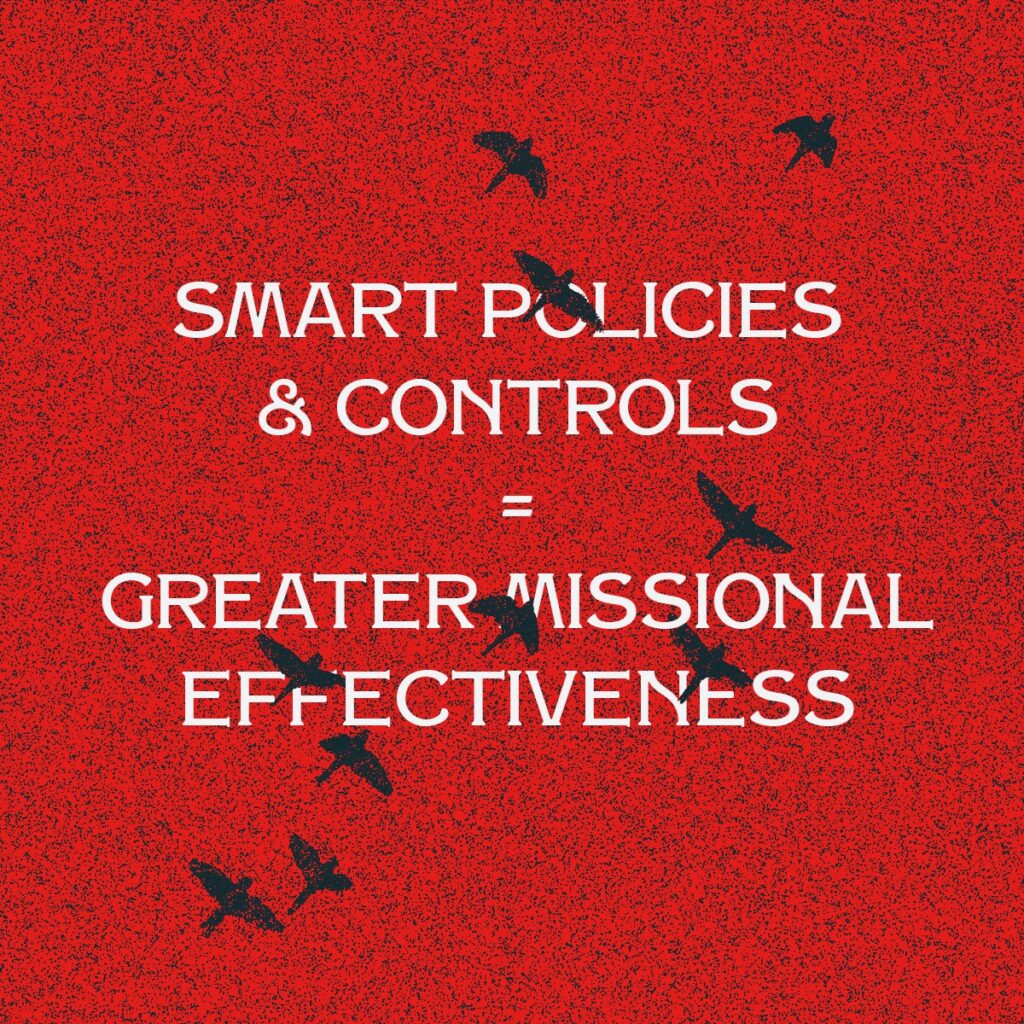
How to Repair Your Church’s Payroll Process
STEP 1: CORRECT HISTORICAL WAGES FOR PASTORS
If you read the above sections and think, “We’ve really messed up withholding on pastors’ paychecks,” you’re not alone. But you can fix it.
If you have been withholding FICA from your pastoral employees, that means both the individual pastors and the church have been paying too much. Here’s what to do:
- Add up what you’ve withheld from your pastors for FICA
- Issue a check for the incorrectly withheld taxes to the pastor and tell the pastor to save that money for tax time
- File an amended 941
- Expect the IRS to refund the church, but it will likely take some time
Correcting historical wages is a tricky calculation. We’re good at it—we’ve done it a lot—but it is some of the most challenging math we ever do. Work this problem with care. (And yes, you can hire us.)
STEP 2: REVISIT WORKER CLASSIFICATIONS FOR MINISTERS, EMPLOYEES, CONTRACTORS, AND VOLUNTEERS
Take another look at everyone you’re paying. Make sure you’ve classified each person correctly and that you’re applying the proper withholding rules to their paychecks.
- Besides getting the withholding correct for ministers, ensure your board has approved housing allowances in writing and that your ministers are receiving it.
- If you’re giving a housing allowance to someone who isn’t a “pastor,” it’s time to correct how you compensate them.
- If you’re paying anyone as a contractor who you should classify as an employee, consider changing their status. Seek advice here: You could alert the IRS when you make the change.
- If you have volunteers receiving compensation, reconsider their status.
STEP 3: REVIEW HOUSING ALLOWANCES, AND CONTINUE TO DO SO ANNUALLY.
A housing allowance isn’t just about what ministers pay for rent or mortgage, but also what they pay for utilities, furniture, home improvements, and more. And the cost of living keeps increasing! If you’re not reviewing that amount yearly, your pastors may miss tax benefits.
STEP 4: SOLIDIFY ALL PAYROLL-RELATED POLICIES AND PROCEDURES
Controls, policies, and procedures help keep churches and their employees on the straight and narrow. And they’ll ensure employees pay the correct taxes—no surprises later!
Make sure you and a knowledgeable accounting pro have established policies and procedures around the following:
- Bonuses
- Fringe benefits and any other non-deductible gifts from the church to its employees
- Benevolence paid to employees
- Health insurance and other benefits
- An accountable reimbursement plan
- W-9 and 1099 forms for contractors (have contractors fill out their W-9s before your first payment to them)
STEP 5: USE A PAYROLL PLATFORM FOR YOUR CHURCH
There is no easy-button payroll platform for churches.
They’re all created with for-profits and non-profits in mind, so you have to know your stuff when you set it up. Honestly, you need to hire someone like us to do it correctly. (Our payroll teammates rock.)
That said, we recommend Gusto. They’re more of a “people platform” than just payroll, and church is about people. For example, we love that you can welcome new people and sign birthday cards through the platform.
One of the other things we love about Gusto is that they automatically file the required state and federal tax forms on the required schedule. That leads into Step 6 … if you have a great payroll platform, that platform will typically file those forms on your behalf.
STEP 6: FILE 941 TAX FORMS ON TIME
Churches must file Form 941 quarterly to report how much federal income, Social Security, and Medicare tax they’ve withheld from staff paychecks.
Form 941 is due quarterly:
- Q1 (January–March): Due April 30
- Q2 (April–June): Due July 31
- Q3 (July–September): Due October 31
- Q4 (October–December): Due January 31
Add those dates to your calendar. Stick them on your monitor. Write them on your mirror to see them when brushing your teeth. File each 941 on time and save your church and your pastors headaches!
In addition to filing the 941 form quarterly, the church must send the taxes they have withheld to the IRS on the required schedule – either monthly or semi-weekly depending on the total tax amount. Paying taxes late or not at all is where penalties and interest start happening. And that can add up to a lot of money over time.
Hear from Lead Pastor Jonathan Wiggins
I had some older accounting software in my church, and we just weren’t able to pull data quickly to make data driven-decisions as a lead team. [Now] we can retrieve information in real time. We can make information-based decisions and really tell our financial story….
Jonathan Wiggins, Rez.Church
Bill Pay for Churches: Payables, Check Requests, and Reimbursements
What are church accounting best practices for payables and reimbursements?
- Place two sets of eyes on every bill
- Collect W9s from vendors before sending payment
- Create standard billpay, check request, and reimbursement forms
- Choose an AP platform (accounts payable platform)
- Train your team on all of the church accounting processes that affect them
Let’s take these ideas one by one.
Step 1: Place Two Sets of Eyes on Every Bill
Create a process where two people review every bill: an Approver and a Payer. The Approver’s job is to double-check the following:
- Account codes
- Amount
- The validity of the bill or reimbursement
- That there are funds available to pay the bill
The Payer:
- Signs the checks
- Has permission on behalf of the board or council to pay bills on the church’s behalf
Here’s why we recommend placing two sets of eyes on every bill.
1. You’ll prevent fraud and temptation.
If one person approves payments and signs checks, your church is at higher risk for embezzlement.
2. You’ll reduce simple errors that waste ministry money.
Accounting errors can happen— a decimal in the wrong spot, transposed numbers, or an incorrect accounting code. These errors only become a problem when those errors slip through the cracks.
For example, one of our team members works as a volunteer Payer for her church. She’s noticed that, from time to time, her Approver will send a check request that had already been paid through an alternate means (like a credit card). The “two eyes on every bill” rule keeps the church from overspending—or simply from the headache of having to ask for a refund.
All payments will run through the same channel, preventing silos and confusion.
Many churches have multiple people spending money in the same categories. If there isn’t a consistent process, bills may go unpaid or not have the appropriate oversight.
>>Note: The person approving a given expense should be higher or equal on the organizational chart to the person submitting the request.
That means:
- The Approver can’t approve their own requests for payment.
- The Lead Pastor should submit requests for payment to the board or council, not to a staff member.
- No one should have to approve or reject a payment request for someone higher than they are on the organizational chart.
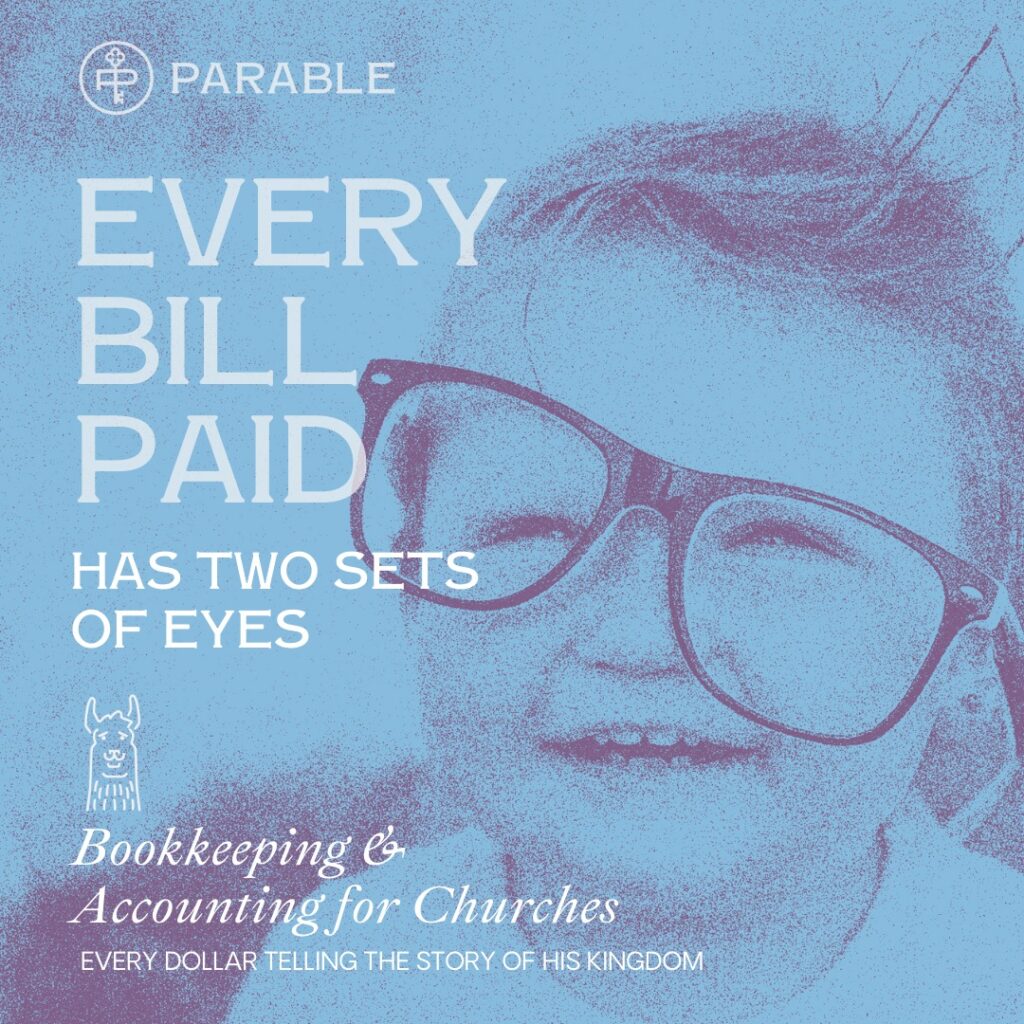
Step 2: Collect W9s from Vendors Before Sending Payment
At the end of the year, many churches waste time as they scramble to collect W9s from vendors and contractors.
Here’s an easy fix: Create a process where you hold payments until the vendor has sent you their W9. Make this a non-negotiable process for your team, even if you pay them below the threshold amount. (You can automate this through your AP platform, which we’ll discuss later.)
Your team member doesn’t have to feel awkward about this. They can just tell the vendor, “Our process prevents me from sending payment until we’ve received a W9.” We find that if you’re holding their money, they’ll respond quickly!
But make sure the person who oversees the bill pay process (usually an Executive Pastor, CFO, Director of Operations, or Lead Pastor) is on board here. You don’t want that person to be misinformed and inadvertently undercut the Payer and Approver’s efforts.
For more on W9s, check out our related resource: The Complete Guide to Payroll for Churches ›
Step 3: Create standard bill pay, check request, and reimbursement forms
You will save time, money, and effort if your teammates submit standardized forms for every expense. And though we know filling out these forms can be a pain, you can make it easy for your teammates. For example:
- Keep paper versions in a common area, like your copy room.
- Distribute them to individual desks.
- Use a Google or Excel spreadsheet and allow staff to print it as a PDF rather than filling out a physical form.
- Utilize software for invoices and reimbursements, such as a bill pay software, reimbursement app, church management software, or giving platform.
What should be included in a church reimbursement or check request form?
- Vendor Name
- Vendor Email
- Vendor Payment Preference (electronic payment or check)
- Vendor Address
- Accounting Category
- Description
- Reason for reimbursement (why the Approver should say “yes”)
- Invoice (attached to the form)
We recommend you keep the information you request to a minimum. Simple forms make it easier for your team to fill them out and turn them in on time.
Step 4: Choose an AP (Accounts Payable) Processor
Not all churches use an AP Processor (bill-paying software) but make payments through ACH. ACH payments are not the worst solution ever, but consider these benefits of an AP processor:
- An AP Processor enables teammates to work remotely without getting in the way of your church accounting best practices or controls.
- It lessens the need for paper by keeping all forms inside a single digital system (this is the 21st century, you know).
- An AP Processor digitizes your processes, making it harder for people to make mistakes (or circumvent them).
The biggest problem we see with ACH Payments is this: The automation happens outside of your church accounting software suite, so no one reviews these payments before they go out.
Say you’ve set up an ACH payment to a missionary. They receive a given amount from you monthly. But if that missionary leaves the mission field, and you don’t have an approval process to review your payment to them before it’s sent, extra payments to them are more likely to slip through the cracks.
Imagine the phone call: “Well sister, you know that money we sent you? We need it back.”
Save yourself the hassle. Switch to an AP Processor.
Best church accounting software for payables
Our favorite AP Processor for churches is BILL (formerly bill.com). We like it for several reasons.
First, your entire team can use it. BILL leads them to do everything according to your approved process. Then, it shows up in your financial team’s inbox for approval, all digitally.
Second, you can set up users with different permissions. You can choose what level of access each team member has to the information provided in a given payment request, so the youth pastor and the worship pastor don’t necessarily have access to each other’s expenses.
Plus, you can set up and automate the roles of Approver and Payer. You can even create different Approvers for special scenarios. For example, you can choose a board member to approve the senior pastor’s expenses.
Third, BILL automatically syncs with QBO, reducing human error. The accounting codes, receipts, and amounts are all applied evenly and correctly across platforms. Then, you reconcile BILL monthly to ensure every invoice you think got paid did get paid.
Step 5: Train your team on all of the accounting processes that affect them
Take time to ensure everyone on your team understands these processes. Make it part of onboarding for new staff members. If someone has trouble filling out a form, help them. If you have a new team member, sit with them the first few times they go through this process so they feel confident.
But don’t just hit them with rules and procedures.
Start with “why.” Here’s what we mean.
“Church accounting best practices keep us on mission.”
Every dollar your church spends can further the gospel or hinder it.
When you’re training people on accounting processes, keep the church’s vision before them. Help them understand your leadership team constructed the budget to accomplish the church’s goals of reaching and helping people.
Your policies don’t exist simply to make “bean counters” happy. They exist to ensure people hear the good news.
“These best practices also protect you, the person requesting payment.”
Policies and procedures around payment and bill pay keep individuals from making errors while keeping the church above reproach.
And yes, auditors are trained to look for signs of non-compliance. You don’t want to make them ask awkward questions no one cares to answer.
5 Steps to Get Your Church Account Payables on Mission
- Analyze current systems, forms, and processes
- Set up an approval chain
- Create helpful billpay, check request, and reimbursement forms
- Set and document new policies and procedures
- Choose a suite of church accounting software solutions
Hear from Pastor Rich Butler
The numbers really don’t lie. And Parable has really helped us parse the story that our numbers are actually telling.
Rich Butler, Hope Church
Most churches tell one story from the pulpit and a completely different story with their finances.
But you can get your money can tell a story of faithfulness to God’s mission and the vision of your church.
Parable’s team of accountants, bookkeepers, and consultants helps churches unlock the story their numbers are telling. Then, we show them what to do about it so they can take action.
If you’d like to get Parable on your team, schedule a call with one of our financial storytellers ›